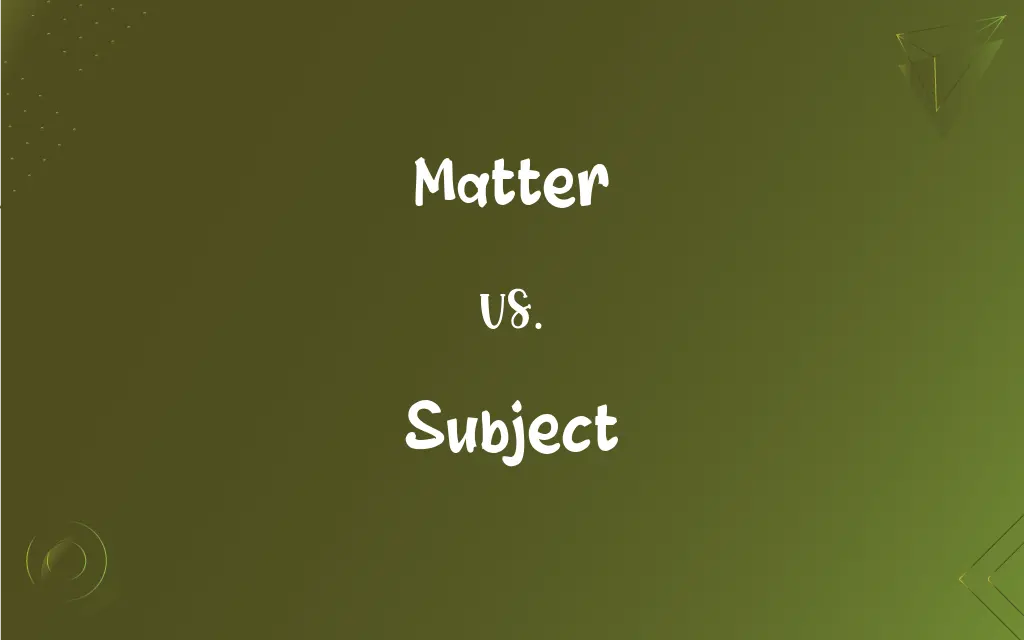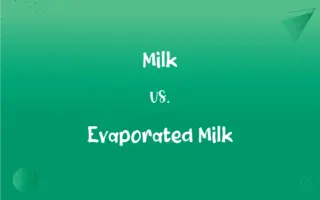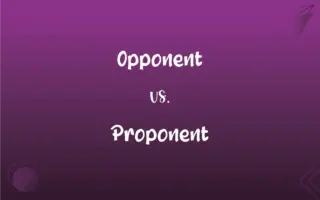Matter vs. Subject: What's the Difference?
Edited by Harlon Moss || By Janet White || Published on January 12, 2024
Matter refers to the substance or content of a discussion, whereas subject is the topic or theme under consideration.

Key Differences
Matter denotes the material or substance of which physical objects are composed, or the essence of a discussion. Subject, in contrast, usually refers to the main topic or theme of a conversation, study, or work of art. While matter forms the core of a discourse, subject defines its boundaries.
In the context of discussions, matter can be seen as the specific details or contents being talked about. Subject, on the other hand, often refers to the broader theme or general area of interest within which these details fall. Matter provides depth, while subject gives context.
When considering writing or speech, matter pertains to the actual ideas, information, or content presented. The subject, in this sense, is the overarching topic or thesis around which the content revolves. Matter fills the structure that the subject creates.
In educational contexts, matter is the specific knowledge or information covered in a course or lecture. Subject is the broader field of study or area of knowledge under which this specific information is categorized. Matter represents the specifics, whereas subject represents the category.
In literature, matter refers to the narrative content, including events, characters, and details. Subject refers to the central theme or underlying message that the author wishes to convey. Matter is the substance of the story, while subject is its underlying meaning.
ADVERTISEMENT
Comparison Chart
Definition in Grammar
The actual content or substance of a sentence or discussion.
The topic or theme of a sentence or discourse.
Usage in a Sentence
Relates to what is being said or written in detail.
Refers to the overall topic or theme being discussed.
In Literary Context
The storyline, characters, and events in a narrative.
The overarching theme or message of the narrative.
In Education
Specific knowledge or information within a course.
The broader field of study or area of knowledge.
In Conversation
The specific details or content being discussed.
The general topic or area of discussion.
ADVERTISEMENT
Matter and Subject Definitions
Matter
A subject or situation under consideration.
The matter of the missing funds was finally resolved.
Subject
A branch of knowledge studied or taught.
Mathematics is my favorite subject in school.
Matter
The reason for distress or a problem.
What's the matter? You seem upset.
Subject
The topic or theme of a book, discussion, or thought.
The subject of her lecture was ancient Greek philosophy.
Matter
Physical substance or material in general.
Scientists study the properties of matter.
Subject
Something likely to be affected by a particular condition.
The coastal areas are subject to flooding.
Matter
A subject of particular importance or relevance.
Environmental conservation is a matter of great concern.
Subject
A person or thing that is being discussed or described.
The subject of the documentary is a famous artist.
Matter
The substance or content of a text or speech.
The matter of his speech was quite controversial.
Subject
The noun or noun phrase governing the verb in a sentence.
In the sentence 'The cat sleeps,' 'the cat' is the subject.
Matter
That which occupies space and has mass; physical substance.
Subject
Being in a position or in circumstances that place one under the power or authority of another or others
Subject to the law.
Matter
A type of such substance
Organic matter.
Subject
Prone; disposed
A child who is subject to colds.
FAQs
Is 'matter' always physical?
No, 'matter' can also refer to the content of a discussion, not just physical substance.
Can 'subject' refer to a person?
Yes, 'subject' can refer to a person being discussed or studied.
Is 'subject' always an academic term?
No, 'subject' can be used in various contexts, not just in academia.
Can 'matter' be intangible?
Yes, when referring to the substance of a discussion or text, it is intangible.
Can 'matter' change its meaning based on context?
Yes, the meaning of 'matter' can vary depending on the context in which it is used.
Are 'matter' and 'subject' interchangeable?
Not always, as 'matter' often refers to details or content, while 'subject' is more about the overall topic.
Does 'subject' always imply a formal study?
No, 'subject' can refer to any topic of discussion or interest, not just formal study.
Can 'matter' refer to a problem?
Yes, 'matter' can be used to refer to a problem or issue.
Is 'subject' used in grammar?
Yes, in grammar, 'subject' refers to the noun or noun phrase that governs the verb in a sentence.
Is 'matter' used in science?
Yes, in science, 'matter' refers to any substance that has mass and takes up space.
Can 'subject' be a person in a photograph?
Yes, 'subject' can refer to the main person or object in a photograph.
Does 'subject' imply subjection or control?
Not necessarily, as it often simply denotes the main topic or theme.
Can 'subject' be multiple topics?
Yes, 'subject' can encompass multiple related topics or themes.
Does 'matter' imply importance?
Sometimes, as in the phrase "a matter of importance," but not always.
Can 'subject' refer to the theme of a movie?
Yes, 'subject' can refer to the central theme or topic of a movie.
Is 'subject' related to perspective?
It can be, especially in art and photography where 'subject' can influence perspective.
Can 'matter' be emotional?
Indirectly, as the content of a discussion (matter) can evoke emotions.
Is 'subject' specific to English grammar?
No, the concept of a grammatical subject exists in many languages.
Can 'matter' refer to legal issues?
Yes, 'matter' can refer to legal cases or issues.
Can 'matter' be used in business contexts?
Yes, 'matter' is often used to refer to business issues or topics.
About Author
Written by
Janet WhiteJanet White has been an esteemed writer and blogger for Difference Wiki. Holding a Master's degree in Science and Medical Journalism from the prestigious Boston University, she has consistently demonstrated her expertise and passion for her field. When she's not immersed in her work, Janet relishes her time exercising, delving into a good book, and cherishing moments with friends and family.
Edited by
Harlon MossHarlon is a seasoned quality moderator and accomplished content writer for Difference Wiki. An alumnus of the prestigious University of California, he earned his degree in Computer Science. Leveraging his academic background, Harlon brings a meticulous and informed perspective to his work, ensuring content accuracy and excellence.

































































